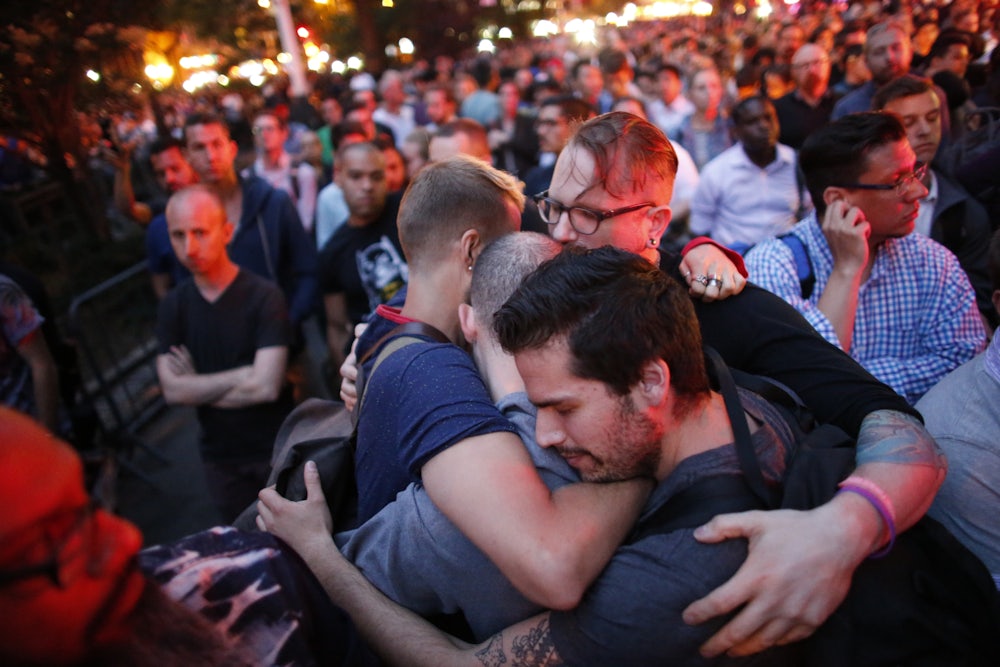I met my first boyfriend when we were 13, playing Dungeons and Dragons in the basement of my local comics shop. We were from the same small town in Maine but went to different schools. He always played a paladin character—the holy soldier—and I played a druid, usually half elf—biracial, like me—and usually a woman. When I made drawings of my characters, they all looked like Storm from the X-Men.
I was a skeptic about God. He was a skeptic about druidic magic. We bantered like the nerd version of Bogie and Bacall and soon, one day, we were in love.
We hid it as a friendship for two years. We were inseparable until our relationship ended when I was 15. Something had gone too far, and I didn’t know what. A few months later, he called and wanted to talk. Before I could ask what was wrong, he begged me to tell him that he was not like me. That he wasn’t gay.
I had always believed he played a paladin was because he was from a conservative Catholic family. Now the idea that he might be gay had pushed him to the edge of suicide. He spoke of wanting to blow his head off. I knew he had guns in the house. And so I broke my own heart, and told him what he wanted to hear.
Yes, you are not like me, I said. Yes. We are different. You are not gay.
When I first told this story to a friend in college, he said to me, “Well, it isn’t possible for everyone. It takes a lot of courage to be out.” I remember how much this surprised me.
This all came back to me as I read the reports coming out of Orlando on Sunday, after the attack on the LGBT club Pulse.
On any given day, I don’t feel particularly brave, and never have. I didn’t think it was brave to be alive and out at the time my friend said this to me. Life was just something that happened and kept happening each time I woke up and made coffee. And I am sure the 49 patrons who died at Pulse that night didn’t necessarily think of themselves as brave for being there. But they were.
My new friend said this to me when we were discussing our relationship, because we were in love. Once again, here was a man I loved, who was telling me he couldn’t be gay. Looking back, maybe in that context, “being gay” just means the will to live out your love and desire for men. The will to endure it in the face of violence, the disapproval of parents, expulsion from the home. The first story I ever heard in the news about a gay man was about the murder, in 1984, of Charlie Howard, who was thrown by his attackers from a bridge to his death. A certain violence has always followed me since coming out, whether I was in a bar where someone threw an M-80 at the door, or attacked in the street—it follows us all. The Pulse murders were the starkest reminder yet that we could be killed for being gay. But this knowledge is something I’ve learned to live with, as I’m sure everyone in that club also had.
We’re still very good friends, my college friend and I. Like my paladin first boyfriend, he is married to a woman now. I have at least two other men like this in my past, maybe more—all are married to women. Social media allows us to stay in touch. Little windows float down my feed of men who didn’t want to live in the world I wake up in every day.
There are multiple reports now that Omar Mateen, the Orlando gunman, was possibly closeted. A male classmate in his police academy class has come forward to say Mateen asked him out ten years ago. Regulars at Pulse recognize him. He was, at the time of the shooting, a private security guard so violent and frightening that a co-worker quit after the company would not take action. He was also, apparently, a man who had gay friends. When he was younger, he used to hang out with a gay drag queen waiter friend at a Ruby Tuesdays in Jensen Beach.
Many are confused by this. Why would he do this? Isn’t it easier to come out today? We may never know. Studies have shown that men who repress their homosexuality due to authoritarian fears can create tremendous homophobic violent outbursts. Instead of attacking what oppresses them, they attack what they fear will betray them. They fill up with a deadly obedience. If Mateen was closeted, out of fear, he made a little more of the world he feared when he opened fire that day.
We have always known that the protection we feel in a queer club is illusory. We’re in the club, but we’re still in America. Some of those shot at Pulse last weekend, on a night popular with working class latinx, could effectively be outed at work by being there, and lose their jobs if their employer decides they don’t want a LGBT person working for them. One survivor is undocumented and closeted, and perhaps unable to connect to the family of his lover. The lack of protections for us is structural, designed to leave us weaker, vulnerable to harm. Everything that happened last Saturday happened because the laws of the land point to it and let it happen.
As I read the stories of the victims, and grieve for them, I am reminded that if there is anything that being gay during the age of AIDS has taught me, it is how to turn grief into resolve. We can honor the dead—their bravery, their openness, and their memory—by making the world they dreamed of into a reality for the living.
